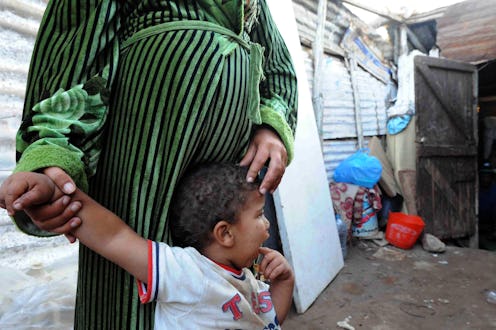News
Morocco Wants To Reform Its Strict Abortion Laws
Perched on the northeastern cusp of the African continent, a small sliver of water separating it from Spain, Morocco is a country famed for its distinct Arabic-European blend of cultures. But decisive efforts to reform Morocco's restrictive abortion law could potentially propel the country forward as a regional pioneer of sorts in regards to its women's rights.
Not atypical in countries where abortion is a taboo subject, the procedure is widely practiced, albeit underground. An estimated 600 to 800 abortions are performed daily in unsanitary, dangerous conditions due to the procedure's illegal nature, except in cases where the mother's life or health is at risk. Speaking to the Associated Press, Moroccan Health Minister Houssaine Louardi indicated that it was time for the country to revise the law.
Morocco’s penal code on abortion is very restrictive, the law is not fair to women. It’s out of date and doesn’t take into account the reality that Moroccans live in these days — there is an urgent need to revise this law.
Leading the push for a reform is Dr. Chafik Chraïbi, president of the Moroccan Association of the Fight Against Clandestine Abortion (AMLAC) and head of obstetrics at Rabat’s maternity hospital. In December, the Ministry of Health fired Dr. Chraïbi from his position at the hospital after he appeared on a French investigative news program criticizing Morocco's abortion laws that gave rise to a flourishing underground abortion industry.
AP reported that Chraïbi's firing sparked a rare debate between intellectuals and lawmakers, resulting in the doctor's reinstatement. The Islamist-led government — with King Mohammed VI as Morocco's top religious authority — then called upon a panel of clerics, doctors and legislators to explore loosening the strict 50-year-old abortion law.
According to Bloomberg Business, Morocco's Health Ministry will consider legalizing abortions in the first six weeks in cases of rape and incest, and before the fourth month if the mother discovers birth defects or genetic diseases in the fetus.
Abortion is illegal in Arab countries — only in cases of fetal malformation or danger to the mother’s health is it allowed — with the exception of Tunisia, which became the first Muslim country to legalize abortion in 1973. However, like Morocco, the procedure is widely carried out under a "don't ask, don't tell" policy, AP reported.
But a revision of the law could affect that in the region's countries as well — in neighboring Algeria, activists are closely observing how the efforts to reform the abortion law play out. Algerian lawyer and feminist activist Nadi Ait Zai told the news wire:
For the last four years we have been working on getting it decriminalized, but it hasn’t moved forward much. It’s a very sensitive question in country like Algeria. We are certainly not indifferent to what is happening in Morocco; we will follow it closely.
But reforming the law could prove more difficult than hoped, as Morocco's religious clerics and Justice Ministry could well put forward one with limited changes. And the country's deeply religious constituency could become an obstacle in those campaigning for a reform. In 2012, when Dutch abortion-rights activist and physician Rebecca Gomperts of Women On Waves — an organization that performs abortions on board a ship for women from countries where it is illegal — attempted to dock at a port in the city of Smir, religious conservatives protested Gomperts, carrying pictures of bloody embryos, shouting accusations at her.
Image: Getty Images (3)
